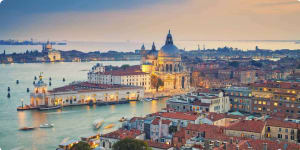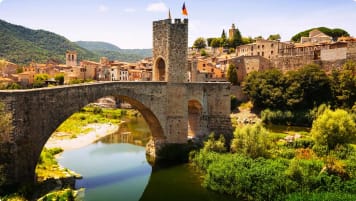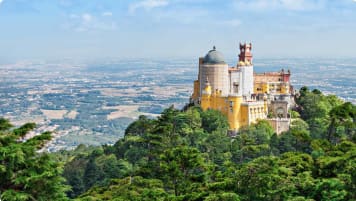European Cities Small Group History and Cultural Winter Tour
An escorted tour A Journey that commences in Rome and takes in 12 destinations along its journey to Athens. This is an off season small group journey with like minded people. A small group tour across Southern Europe with local guides sharing authentic in-country authentic experiences for mature couples and solo travellers.
From A$17,995AUD
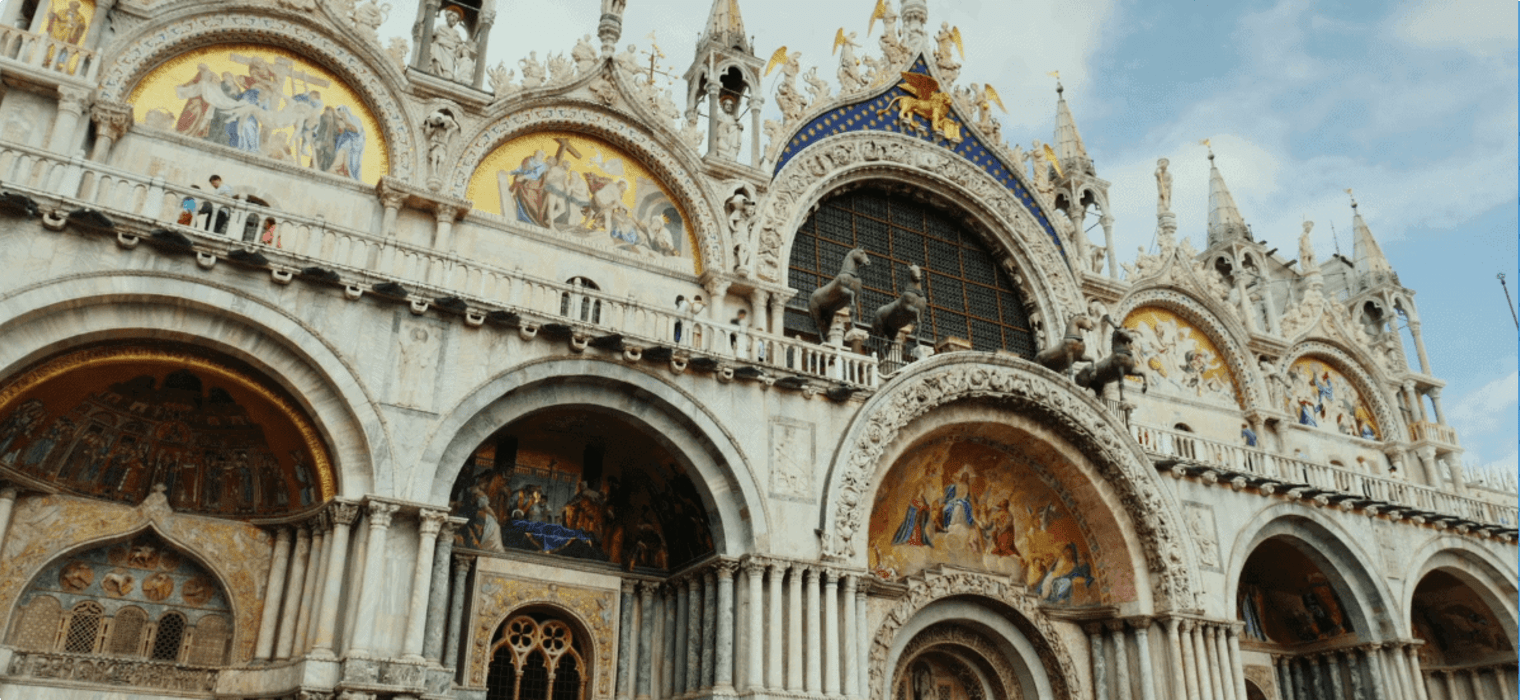
Highlights
- 1. See the pope's Christmas Day address in Rome
- 2. A full day touring Istria, the largest peninsula in the Adriatic
- 3. Experience Delphi, Marathon, and The Acropolis
- 4. Explore Albania's capital, the magnificent Tirana

Departure Dates
| Departure Date | Price |
|---|---|
| 22 December 2025 Ends 17 January 2026 • 27 days A$17,995 Twin A$20,995 Single Available | Selected |
| 22 December 2026 Ends 17 January 2027 • 27 days A$17,995 Twin A$20,995 Single Available | |
| 22 December 2027 Ends 17 January 2028 • 27 days A$18,450 Twin A$21,395 Single Available |
European Winter Tour: Visit Southern European Cities
This extraordinary European Cities small group winter tour takes senior couples or solo travellers through
We experience Christmas in Rome, New Year's Eve in Venice, and visit the famous archaeological sites of Greece.
Itinerary of this European Winter Tour
The tour starts in Rome where we spend 6 days. Together we'll visit the Vatican (Sistine Chapel and St Peter’s Basilica), the Piazza Navona Christmas Market, Galleria Borghese and Capitoline Museums as well as enjoying guided tours of the city led by a local guide. We'll have a traditional Christmas Eve dinner together and attend the Christmas mass at St. Peter's Square the next day. You'll also have plenty of time to explore Rome at your own pace. Then we'll board a train to Florence, where we visit the Accademia Gallery and the Bargello museum and you'll also have a day at leisure. Our next stop is Venice where we celebrate New Year's Eve by watching the famous fireworks. Then we spend the next 6 days in Croatia, staying in Opatija, Zadar and Dubrovnik while exploring Roman ruins, the Plitvice National Park and many more. Our next stop is Albania where we take a tour of Tirana before travelling to Ohrid in Macedonia. The final leg of our trip is in Greece, where we spend time in Veroia, Kalambaka and Delphi before the tour concludes in Athens.
Highlights of this Small Group tour
Highlights of the tour include taking in the spectacular New Year's Eve fireworks and celebrations in Venice, and witnessing the Pope's Christmas Day address at the Vatican. Later, we take the chance to explore Istria, the largest peninsula in the Adriatic, as well as travelling to famous destinations in Greece Delphi, Marathon, and The Acropolis. At the end of the tour, we also explore Tirana, Albania's magnificent capital, another highlight of this once-in-a-lifetime tour. Throughout the tour we're joined by local guides to enrich the experience with local knowledge.
For more details, click the ‘Top 5’ or ‘Itinerary’ buttons above! If you’re keen to experience this tour from Odyssey Traveller Australia, please call or send an email. Alternatively, to book, simply fill in the form on the right hand side of this page.
Gallery

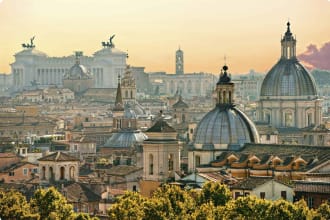
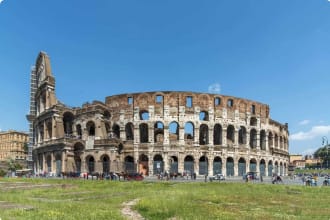
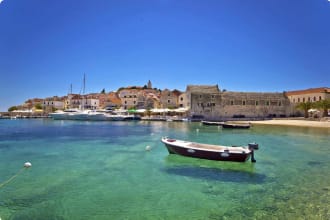
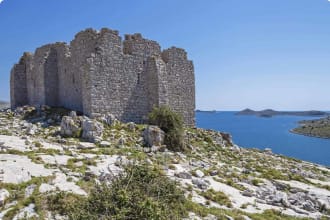

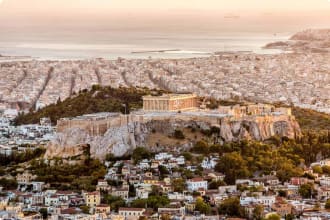
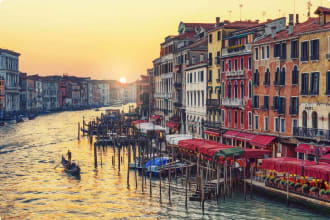

Itinerary
27 days
Day 1: Rome
Accommodation: Trianon Borgo Pio apartments or similar
We arrive in Rome and meet at the hotel. You have the day at leisure, until our evening walk to the local restaurant, where we’ll enjoy a welcome dinner.
(D)
Day 2: Rome
Accommodation: Trianon Borgo Pio apartments or similar
After being issued with a 7 day transport pass, we will be joined by a local guide. In the morning, we head to Vatican City tour the Vatican and Sistine Chapel, and visit St Peter’s Basilica. In the afternoon, we take a tour of Rome that includes entrance to the beautiful Basilica of San Clemente, built in the eleventh century.
Day 3: Rome
Accommodation: Trianon Borgo Pio apartments or similar
Today, you have a day at leisure to explore the historic sites of Rome on your own, and make use of the transport pass. In the evening, we walk to a local restaurant where we’ll enjoy a Traditional Christmas Eve Dinner.
(D)
Day 4: Rome
Accommodation: Trianon Borgo Pio apartments or similar
It is Christmas Day, so after breakfast in the hotel we will walk to St Peter’s Square where we will attend the Pope’s midday address. After the address, we will visit the Piazza Navona Christmas Market. In the evening, we’ll enjoy dinner at a local restaurant.
(B,D)
Day 5: Rome
Accommodation: Trianon Borgo Pio apartments or similar
After breakfast at the hotel, we embark on a full day tour of Rome. In the morning, we visit the Galleria Borghese, which houses many extraordinary Italian artefacts and paintings. Then, we visit the magnificent Capitoline Museums. After this, we stop the view the famous Colosseum from outside. You have the remainder of the day at leisure.
(B)
Day 6: Rome
Accommodation: Trianon Borgo Pio apartments or similar
In the morning, we transfer to Tivoli by coach, and are joined by a guide. While there, we tour of Hadrian’s Villa, a spectacular world heritage site which includes a complex of classical buildings, constructed by Emperor Hadrian in the 2nd century.
Day 7: Florence
Accommodation: Hotel Londra or similar
In the morning, we transfer to coach to the station where we board a train to Florence. Arriving in Florence, we walk to our hotel (Includes porterage of one bag per person from station to hotel). Then, in the afternoon, we take a walking tour of Florence. We will visit the Accademia Gallery, which inclues some extroardinary Michelangelo sculptures, and the Bargello museum. The Palazzo del Bargello is Florence’s oldest public building, a former barracks and prison that now displays a number of masterpieces, and works by Michelangelo and Bernini.
In the evening, we walk to a restaurant near our hotel.
(D)
Day 8: Florence
After breakfast, you have a day at leisure to explore Florence as you wish.
(B)
Day 9: Venice
Accommodation: Ca de Conti hotel or similar
After breakfast, we walk to the station where we board a train to Venice. (Porterage of one bag per person from hotel to station).
Arriving at Venice in the early afternoon, we take a private boat transfer to the hotel. Then, we take a half day tour of the city, which includes entrance to the Ca’ d’Oro or Palazzo Santa Sofia, a palace on the Grand Canal.
In the evening, we walk to a restaurant near our hotel, where we enjoy dinner.
(B,D)
Day 10: Venice
It’s New Years Eve! After breakfast in the hotel, you have a day at leisure to enjoy exploring Venice. You may also want to get some rest, as we’ll be walking from the hotel to view the spectacular midnight fireworks.
(B)
Day 11: Opatija
Accommodation: Grand Hotel Adriatic or similar
Today, we travel to Croatia. After breakfast, we check out of the hotel late morning. We take a private boat transfer to Tronchetto, then head to Palmanova (a star fort town of the late renaissance), where we take a short walking tour. We then travel to Trieste, a city and seaport, where we take a short walking tour. We travel from Trieste across the border to Optaija. We enjoy dinner in the hotel, before spending our first night in Croatia.
Day 12: Opatija
Accommodation: Grand Hotel Adriatic or similar
Today, we have a full day in Istria, the largest peninsula in the Adriatic. We are joined by a local guide and travel to Hrastovlje, where we visit the Church of the Holy Trinity, which contains a lovely late medieval fresco. Then, we head to Porec where we enter the Byzantine-style Euphrasian Basilica and the Bishop’s Palace, originally built in the 6th century. We travel on to Rovinj, where we stop to view the beautiful coastal town, before going on to Pula, where we take a tour that includes the Roman Ampitheatre. We return to Opatija to spend the night.
(B)
Day 13: Zadar
Accommodation: Hotel Kolvare
After breakfast we travel to Plitvice, a national park full of natural wonders, where we take a tour of the park waterfalls. We then travel to Zadar where we view the extraordinary Sea Organ – which uses pipe organs to create music from the waves – and the Sun Salutation – which converts solar energy into illumination.
We have dinner at the hotel.
(B,D)
Day 14: Dubrovnik
Accommodation: Antica Ragusa hotel or similar
After breakfast, we travel to Sibenik by coach, where we view the impressive Cathedral of St James. We then travel on to the beautiful waterfront city of Split, where we take a tour of the city and enter Diocletian’s Palace, built by Rome at the turn of the 4th century. The coach then takes us to Dubrovnik. We walk from our hotel to a local restaurant, where we enjoy dinner.
(B,D)
Day 15: Dubrovnik
Accommodation: Antica Ragusa hotel or similar
After breakfast, we take a half-day tour of Dubrovnik; we enter the Franciscan monastery, the first part of which was constructed in the 13th century. We also visit the War Photo Museum.
The afternoon is at leisure; then we take a Cable car to Mount Srd, from where you can look over the city.
(B)
Day 16: Dubrovnik
Accommodation: Antica Ragusa hotel or similar
After breakfast in the hotel, you have the day free to explore Dubrovnik at your leisure.
(B)
Day 17: Tirana
Accommodation: Grand Hotel Tirana or similar
Today, we travel to Albania. After breakfast we head from Dubrovnik to Kotor, which includes a ferry trip from Kamenari to Lepetane. We take a walking tour of Kotor, before travelling on to Shkoder where we visit the fortress Rozafa, a magnificent, ancient castle. We travel on to Tirana, where we have dinner near our hotel.
(B,D)
Day 18: Ohrid
Accommodation: Apartment Joven or similar
After breakfast in the hotel, we take a tour of Tirana, Albania’s capital. We visit Et’hem Bey Mosque, built in the 18th century, and Sali Shijaku House, sometimes claimed to be the oldest house in the Balkans. We then travel from Tirana to Ohrid, in Macedonia, where we enjoy dinner at a restaurant near the hotel.
(B,D)
Day 19: Ohrid
Accommodation: Apartment Joven or similar
After breakfast, you have today at leisure to explore Ohrid on your own.
(B)
Day 20: Ohrid
Accommodation: Apartment Joven or similar
After breakfast, we enjoy a half day guided tour of Ohrid. This includes a visit to the Robev Family House National Museum, which houses local artefacts, and the striking Sveta Sophia Church. We then travel to Boletin where we visit the magnificent St John Bigorski Monastery. We return to Ohrid where we spend the night.
Day 21: Veroia
Accommodation: Hotel Makedonia or similar
Today, after breakfast, we leave Ohrid, first travelling to Resen where we visit the Saraj, a gorgeous neoclassical estate, containing a gallery and library. We travel on to Bitola where we visit the local museum (once an army barracks), and enter the Heraclea archaeolgical site and museum. The coach then takes us to Veroia, in Greece, where we have dinner in the hotel.
(B)
Day 22: Veroia
Accommodation: Hotel Makedonia or similar
Today, after breakfast in the hotel, we take a coach to Naousa, in Greece, where we visit the site of Aristotle’s school. We then travel to Lefkadia where we enter the Macedonian Tomb of the Palmettes. The coach then takes us to Pella where we visit the Pella museum and the local archaeological site. From Pella, we head to Vergina, and visit the Royal Tombs. We end the day in Veroia.
Day 23: Kalambaka
Accommodation: Kosta Famissi or similar
We begin the day, after breakfast, travelling to Kalambaka by coach. A local guide will meet us for tours of the Great Meteoran monastery and the Varlaam Monastery. We have dinner at the hotel.
(B,D)
Day 24: Delphi
Accommodation: Hotel Iniohos or similar
Today, after breakfast, we are taken by coach to the famous thermopylae, where we view the memorial to Agamemnon and the Spartans. We then travel to Delphi, where a local guide takes us on a tour of the archaeological site and museum. We have dinner at the hotel.
(B,D)
Day 25: Athens
Accommodation: Ava apartments or similar
From Delphi, we travel to Marathon, where we stop to view the marble memorial. From Marathon we travel to Athens, where we visit the Dromeas runner statue. We spend the night in Athens.
(B)
Day 26: Athens
Accommodation: Ava apartments or similar
Today we enjoy a guide joins us for a full day tour of Athens. We visit the Acropolis and museum, see the Theatre of Disonysus, and take a walking tour of Plaka. In the evening, a transfer is organised to take us from our hotel, to a restaurant in Plaka, where we will enjoy a farewell dinner, and then back to our hotel.
(B,D)
Day 27: Athens
After breakfast, we say our farewells, and the tour draws to a close.
Includes / Excludes
What’s included in our Tour
- 26 nights of hotel accommodation.
- 21 breakfasts, and 13 dinners.
- Transport in comfortable and modern coaches.
- All excursions, entrance fees, and local guides.
- Service charges and gratuities.
- Services of a tour leader for the duration of tour.
What’s not included in our Tour
- International airfares and departure taxes.
- Comprehensive travel insurance.
- Items of a personal nature such as telephone calls and laundry.
Participants must be able to carry their own luggage, climb and descend stairs, be in good health, mobile and able to participate in 3-5 hours of physical activity per day, the equivalent of walking / hiking up to 8 kilometers per day on uneven ground.
Book now
Make it a private tour
Easing your journey
Crossing international borders with restrictions
The list of requirements to travel internationally has changed and will continue to change for several years. Odyssey is here to assist you in managing your way through these requirements:
For more information see our Crossing international borders with restrictions page.
Book With Confidence
If less than 30 days before your tour starts you are unable to travel as a result of Government travel restrictions, Odyssey Traveller will assist you with a date change, provide you with a credit or process a refund for your booking less any non-recoverable costs.
See Terms and conditions for details.
Peace of Mind Travel
The safety of our travellers, tour leader, local guide and support staff has always been our top priority and with the new guidelines for public health and safety for keeping safe for destinations around the world, we’ve developed our plan to give you peace of mind when travelling with us.
See Peace of Mind Travel for details.
Reading List Download PDF
Rome: The Biography of a City
Christopher Hibbert
This beautifully written, informative study is a portrait, a history and a superb guide book, capturing fully the seductive beauty and the many layered past of the Eternal City. It covers 3,000 years of history from the city's quasi-mythical origins, through the Etruscan kings, the opulent glory of classical Rome, the decadence and decay of the Middle Ages and the beauty and corruption of the Renaissance, to its time at the heart of Mussolini's fascist Italy. Exploring the city's streets and buildings, peopled with popes, gladiators, emperors, noblemen and peasants, this volume details the turbulent and dramatic history of Rome in all its depravity and grandeur.
The Edge of the World: A Cultural History of the North Sea and the Transformation of Europe
Michael Pye
Saints and spies, pirates and philosophers, artists and intellectuals: they all criss-crossed the grey North Sea in the so-called "dark ages," the years between the fall of the Roman Empire and the beginning of Europe's mastery over the oceans. Now the critically acclaimed Michael Pye reveals the cultural transformation sparked by those men and women: the ideas, technology, science, law, and moral codes that helped create our modern world.
This is the magnificent lost history of a thousand years. It was on the shores of the North Sea where experimental science was born, where women first had the right to choose whom they married; there was the beginning of contemporary business transactions and the advent of the printed book. In The Edge of the World, Michael Pye draws on an astounding breadth of original source material to illuminate this fascinating region during a pivotal era in world history.
A Concise History of Greece (Cambridge Concise Histories)
Richard Clogg
Now re-issued in a third, updated edition, this book provides a concise, illustrated introduction to the modern history of Greece, from the first stirrings of the national movement in the late eighteenth century to the present day. The current economic crisis has marked a turning point in the country's history. This third edition includes a new final chapter, which analyses contemporary political, economic and social developments. It includes additional illustrations together with updated tables and suggestions for further reading. Designed to provide a basic introduction, the first edition of this hugely successful Concise History won the Runciman Award for the best book on an Hellenic topic published in 1992 and has been translated into twelve languages.
Modern Greece: What Everyone Needs to Know
Stathis Kalyvas
When Greece's economic troubles began to threaten the stability of the European Union in 2010, the nation found itself in the center of a whirlwind of international finger-pointing. In the years prior, Greece appeared to be politically secure and economically healthy. Upon its emergence in the center of the European economic maelstrom, however, observers and critics cited a century of economic hurdles, dictatorships, revolutions, and more reasons as to why their current crisis was understandable, if not predictable. The ancient birthplace of democracy and countless artistic, literary, philosophical, and scientific developments had struggled to catch-up to its economically-thriving neighbors in Western Europe for years and quickly became the most seriously economically-troubled European country following a fiscal nosedive beginning in 2008. When the deficit and unemployment skyrocketed, the resulting austerity measures triggered widespread social unrest.
The entire world turned its focus toward the troubled nation, waiting for the possibility of a Greek exit from the European Monetary Union and its potential to unravel the entire Union, with other weaker members heading for the exit as well. The effects of Greece's crisis are also tied up in the global arguments about austerity, with many viewing it as necessary medicine, and still others seeing austerity as an intellectually bankrupt approach to fiscal policy that only further damages weak economies.
In Modern Greece: What Everyone Needs to Know®, Stathis Kalyvas, an eminent scholar of conflict, Europe, and Greece combines the most up-to-date economic and political-science findings on the current Greek crisis with a discussion of Greece's history. Tracing the nation's development from the early nineteenth century to the present, the informative question-and answer format covers key episodes including the independence movement of the early nineteenth century, the massive ethnic cleansing in Turkey and Greece following World War I, the German occupation in World War II, the following brutal civil war, the conflict with Turkey over Cyprus, the military coup of 1967, democracy at long last, and the country's entry into the European Union.
Written by one of the most brilliant political scientists in the academy, Modern Greece is the go-to resource for understanding both the current crisis and the historical events that brought the country to where it is today.
Greece: A Short History of a Long Story, 7,000 BCE to the Present
Carol G. Thomas
Greece: A Short History of a Long Story presents a comprehensive overview of the history of Greece by exploring the continuity of Greek culture from its Neolithic origins to the modern era.
~ Tells the story of Greece through individual personalities that inhabited various periods in the lengthy sweep of Greek history
~ Uses an approach based on recent research that includes DNA analysis and analyses of archaeological materials
~ Explores ways in which the nature of Greek culture was continually reshaped over time
~ Features illustrations that portray the people of different eras in Greek history along with maps that demonstrate the physical sphere of Greece and major events in each of the periods
The Balkans: A Short History
Mark Mazower
Throughout history, the Balkans have been a crossroads, a zone of endless military, cultural, and ecomic mixing and clashing between Europe and Asia, Christianity and Islam, Catholicism and Orthodoxy. In this highly acclaimed short history, Mark Mazower sheds light on what has been called the tinderbox of Europe, whose troubles have ignited wider wars for hundreds of years. Focusing on events from the emergence of the nation-state onward, The Balkans reveals with piercing clarity the historical roots of current conflicts and gives a landmark reassessment of the region s history, from the world wars and the Cold War to the collapse of communism, the disintegration of Yugoslavia, and the continuing search for stability in southeastern Europe.
The Balkans in World History
Andrew Wachtel (ed.)
In the historical and literary imagination, the Balkans loom large as a somewhat frightening and ill-defined space, often seen negatively as a region of small and spiteful peoples, racked by racial and ethnic hatred, always ready to burst into violent conflict. The Balkans in World History re-defines this space in positive terms, taking as a starting point the cultural, historical, and social threads that allow us to see this region as a coherent if complex whole. Eminent historian Andrew Wachtel here depicts the Balkans as that borderland geographical space in which four of the world's greatest civilizations have overlapped in a sustained and meaningful way to produce a complex, dynamic, sometimes combustible, multi-layered local civilization. It is the space in which the cultures of ancient Greece and Rome, of Byzantium, of Ottoman Turkey, and of Roman Catholic Europe met, clashed and sometimes combined. The history of the Balkans is thus a history of creative borrowing by local people of the various civilizations that have nominally conquered the region. Encompassing Bulgaria, Croatia, Bosnia and Herzegovina, Serbia, Montenegro, Albania, Macedonia, Greece, and European Turkey, the Balkans have absorbed many voices and traditions, resulting in one of the most complex and interesting regions on earth.
History of the Ancient Civilizations that Defined our World: The Gauls (History Books, Roman Empire, Ancient History, Ancient Rome)
Virtus Libris
For centuries the empire of Rome dominated the continent of Europe. Its armies patrolled the four corners of the known world, from Africa to the Middle East to the edges of Britain. In the ancient world, Rome was the name that conjured sentiments of fear and dread. But to the Romans, there was an ancient evil that even they feared: The Gauls.
The Gauls were a warrior race, fearful to the Romans with their hairy bodies and thick mustaches, a Celtic group whose sole desire was to demonstrate their valor through combat. As the fledgling Roman Republic was establishing itself on the Italian Peninsula, the specter of Gaul loomed on the horizon.
Before the founding of the Roman Empire, the city of Rome was destroyed by the Gauls. During the Punic Wars, the Gauls allied with Rome’s arch-enemy, the Carthaginians, assisting Hannibal in his crossing of the Alps and his razing of the Italian countryside. Rome would one day become great; to get there, it would have to shake off the persistent nightmare of Gaul.
Ancient Rome: The Rise and Fall of an Empire
Simon Baker
This is the story of the greatest empire the world has ever known. Simon Baker charts the rise and fall of the world's first superpower, focusing on six momentous turning points that shaped Roman history. Welcome to Rome as you've never seen it before - awesome and splendid, gritty and squalid.
From the conquest of the Mediterranean beginning in the third century BC to the destruction of the Roman Empire at the hands of barbarian invaders some seven centuries later, we discover the most critical episodes in Roman history: the spectacular collapse of the 'free' republic, the birth of the age of the 'Caesars', the violent suppression of the strongest rebellion against Roman power, and the bloody civil war that launched Christianity as a world religion.
At the heart of this account are the dynamic, complex but flawed characters of some of the most powerful rulers in history: men such as Pompey the Great, Julius Caesar, Augustus, Nero and Constantine. Putting flesh on the bones of these distant, legendary figures, Simon Baker looks beyond the dusty, toga-clad caricatures and explores their real motivations and ambitions, intrigues and rivalries.
The superb narrative, full of energy and imagination, is a brilliant distillation of the latest scholarship and a wonderfully evocative account of Ancient Rome.
